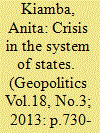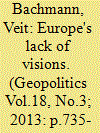| Srl | Item |
| 1 |
ID:
123726


|
|
|
|
|
| Publication |
2013.
|
| Summary/Abstract |
This commentary responds to the essay Trapped in the Logic of the Modern State System? European Integration in the Wake of the Financial Crisis by Alex Murphy. The essay discusses the perseverance of the modern state system in an integrated Europe in the midst of the ongoing financial crisis. Murphy's essay raises a number of important observations and lessons for regions seeking to use the European Union model of integration. To this extent he submits that the essay is about engaging with the monetary experiences in Europe and the financial crisis experienced by the European Union since 2009. Murphy's essay provides its audience with the rationale behind the creation of the European monetary union, the structural challenges associated with the Union and the nationalist sentiments of its members amid deeper integration. The essay also provides its readers with lessons about integration and its challenges. In summary, the essay argues that the European Union has not achieved the desired level of integration because of a number of constraints, including the financial crisis which affirms that nationalist sentiments continue to exist even within a supranational institution like the European Union. Murphy's argument is that considerable attention has been specifically directed to the European Monetary Union at the expense of other integration projects. Indeed, as the financial crisis persists, its member states are becoming more fixated on their national interests. He observes that there are member states who have called on the economically weaker states like Greece to leave the Union. The essay concludes by recommending a shift in focus towards transnational networks and functional arrangements of integration rather than monetary and fiscal initiatives. The European Union provides us with an appropriate case study.
|
|
|
|
|
|
|
|
|
|
|
|
|
|
|
|
| 2 |
ID:
123727


|
|
|
|
|
| Publication |
2013.
|
| Summary/Abstract |
On 1 November 2013, the European Union will celebrate its twentieth birthday. On 12 October 2012, the Nobel Committee announced the Nobel Peace Prize 2012 will be awarded to the European Union "for over six decades contributed to the advancement of peace and reconciliation, democracy and human rights in Europe".1 In the following, I will comment on Alec Murphy's paper Trapped in the Logic of the Modern State System? European Integration in the Wake of the Financial Crisis2 and argue that never before in the history of European integration, has the European 'idea' had so little inspiration and appealing visions for the future of integrating/integrated Europe to offer. This constitutes a fundamental
problem as we can currently observe a rise of nationalism and the (re-)constructions of 'us vs. them' binaries in Europe. In my argument, I side with Murphy in that both the lack of vision and such constructions are, at least partially, rooted in what he describes as a metageographical mindset based on the logic of the modern state system. Murphy traces insightfully how essential parts of the European integration processes have been trapped in a way of thinking determined by a "modernist political territorial order",3 despite the challenge European integration presents to that order (p. 3). His argument is framed around the question of why European Monetary Union (EMU) was prioritised as the preferred way to promote European integration as opposed to other possible paths of integration that seem(ed) less trapped in such modern, territorial, state-based logic.
|
|
|
|
|
|
|
|
|
|
|
|
|
|
|
|